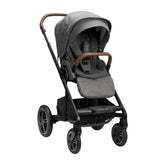Nut Allergies: How to Spot Them & What Parents Need to Know

Your healthy toddler just ate a peanut butter cookie offered by a playmate and now has hives. Though she seems fine, you're concerned it may be an allergic reaction. Nuts can be especially frightening to parents of young children because we’ve all heard terrifying stories of serious – sometimes fatal – allergic reactions. Understanding how to navigate a potential nut allergy is crucial because even small traces can lead to big problems for some little ones. Today, we’re taking a closer look at the signs of nut allergies in children, from skin issues to breathing problems. The goal? To act fast and smart if your child shows any of these symptoms because knowing what to do can make all the difference in keeping them safe and healthy.
Peanuts vs. Tree Nuts
For starters, parents need to understand that the term "nuts" covers two distinct categories—peanuts (which are legumes) and tree nuts like almonds, cashews, walnuts, hazelnuts, macadamia nuts, Brazil nuts, and pistachios. According to Johns Hopkins All Children’s Hospital, both peanut and tree nut allergies rank among the top eight common food allergies likely to trigger severe reactions, affecting approximately 5% of American children.
Peanut allergies are particularly widespread, with around 2.5% of children affected, marking a 20% increase since 2010, according to the American College Of Allergy, Asthma, and Immunology. Although peanut and tree nut allergies differ, they are interconnected, as 25-40% of those allergic to peanuts also exhibit allergies to tree nuts. Understanding these distinctions is key to managing and preventing severe allergic reactions in children.
Symptoms of a Nut Allergy in Children
Nut allergy symptoms differ among children and can vary based on the specific nut and the severity of the allergy. Even a tiny amount of the allergen can trigger symptoms; for instance, Johns Hopkins Medicine notes that 1/44,000 of a peanut kernel is enough to cause a reaction in an allergic individual. These symptoms occur due to an exaggerated response from the child's immune system, which sees the nut protein as a threat and releases excessive histamine to combat it. It's this surplus of histamine that leads to the recognizable symptoms of food allergies.
Nut allergies in kids can show a range of symptoms, from mild to severe, and what you see might depend on your child's age. In infants and toddlers, common signs are hives and vomiting. Older kids could have more symptoms, like swelling, itching, runny nose, coughing, sneezing, eyelid swelling, diarrhea, and dizziness. Some kids might also experience wheezing, difficulty breathing, and even anaphylaxis—a severe and sometimes fatal allergic reaction.
Often, parents are able to spot the usual signs of nut allergies, but sometimes symptoms can be less obvious. For young kids who can't express themselves well, things like stomach aches or sleepiness might be signs of an allergy that parents could miss. Other less clear signs might include confusion or a general sense of something being wrong, often described as an "impending sense of doom."
Better for baby, better for the planet! Zip Top Baby + Kid Snack Containers are designed to fit in little hands and cup holders. Zip Top’s large, soft zippers are easy for little fingers to open and close. Made of 100% platinum silicone, they are endlessly reusable and dishwasher-safe.
Zip Top Baby + Kid Snack Containers
Evaluating the Severity of an Allergic Reaction
It's useful to recognize the difference between mild and severe allergic reactions to nuts. A mild reaction might look like an itchy or runny nose, sneezing, or mild tummy pain, or they may show hives or swelling on one side of the lip.
While all allergic reactions need attention, a severe reaction is a medical emergency. Severe reactions usually happen fast and include symptoms like eyelid or lip swelling, coughing, drooping, itching, hives, and vomiting. If your child shows signs like full-body hives, trouble breathing, feeling faint, or repetitive vomiting, call 911 immediately. Administer emergency medication, like an EpiPen, if you have it. Trust your instincts—if it seems severe, don't hesitate to use emergency medication and call for help.
What to Do If a Nut Allergy Is Suspected
If you're worried your child might have a nut allergy, see your pediatrician. If they suspect a nut allergy, they'll likely send you to a pediatric allergist. For concerns about peanut or tree nut reactions, a board-certified allergist, preferably experienced with food allergies, is the go-to. The allergist will gather a detailed history of your child's allergic experiences, past exposures, and potential reactions. Tests like blood tests and skin prick tests may follow. Blood tests measure your child's immune response and check for specific antibodies. Skin tests involve exposing a small amount of allergen to the skin, pricking it, and looking for reactions like raised bumps. In some cases, "oral food challenges" may be done, where safe amounts of the allergen are given, and your child is closely monitored for reactions right in the allergist's office.

Treating Nut Allergies in Children
Managing your child's nut allergies means steering clear of any nuts they're allergic to. However, this isn't always straightforward since peanuts and tree nuts sneak into many pre-packaged foods, mixes, and sauces. (Get ready to become an expert label reader if your child develops a nut allergy!) Be wary of cross-contamination, and pay attention to warnings like "made on equipment shared with tree nuts or peanuts."
Always keep medication handy because, despite being ultra-careful, accidental exposures can happen. For mild symptoms, pediatricians often suggest using an antihistamine like Benadryl. If it's severe, you'll need to use an epinephrine auto-injector, like an EpiPen, right away. Talk openly with your doctor to create a personalized treatment plan for your child. This ensures you're well-equipped as a parent dealing with allergies. Every child needs an individualized plan, and your doctor can guide you on food avoidance, label reading, and treatment choices.
Preventing a Nut Allergy in Children
If there's a family history of nut allergies or you're worried about your child developing one, you might be wondering how to prevent it. While there's no guaranteed way to avoid food allergies (they can happen unexpectedly), introducing allergens early in your baby's life might help.
Recent guidelines from the Academy of American Pediatrics (AAP) and the USDA suggest starting common allergens as early as 4 to 6 months. Introducing all common allergens around this age is crucial for reducing the risk. For kids at high risk, like those with a family history of allergies, the AAP and USDA emphasize that introducing nuts between 4 to 6 months is especially important. Your decision on when and how to introduce allergens should be a joint effort with your pediatrician.
The Bottom Line on Nut Allergies in Children
Discovering allergy symptoms in your child right after they eat peanuts or tree nuts can be alarming and nerve-wracking. Allergies are scary, and seeing your child unwell is something no one wants. If your child shows symptoms that could indicate an allergic reaction, stay calm but take the signs seriously.
For mild symptoms, reach out to your pediatrician's office for advice or schedule an appointment for a closer look. If the signs are severe—trouble breathing, extensive hives or swelling, extreme tiredness, vomiting, or indications of shock—don't hesitate. Call 911 or take your child to the nearest emergency room right away.
Disclaimer: The information on our site is NOT medical advice for any specific person or condition. It is only meant as general information. Please contact your health provider if you have any medical questions or concerns about your child or yourself.









